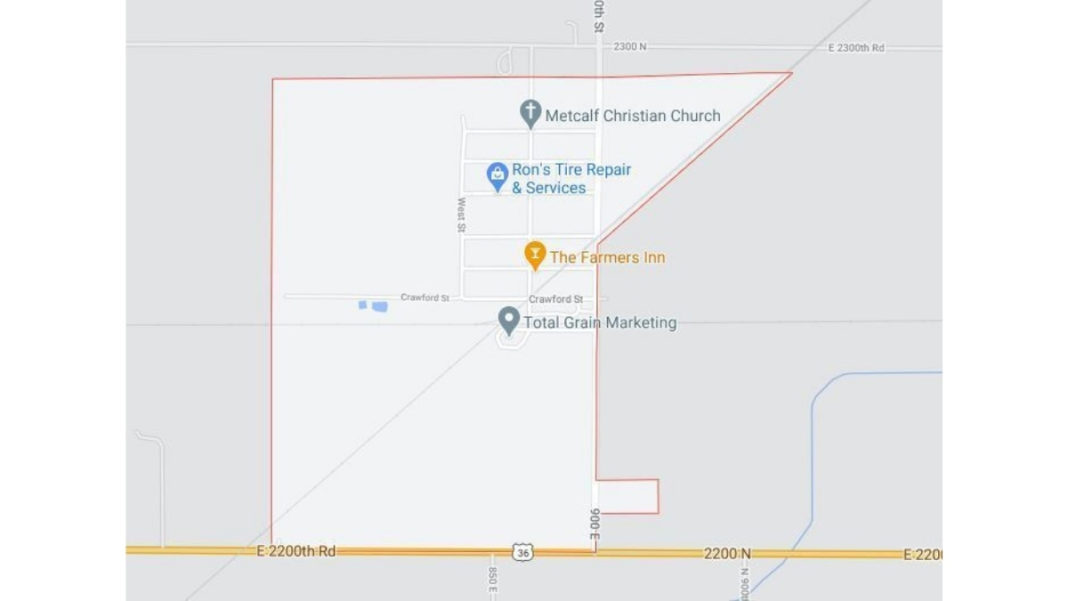What Happens When No One Runs For Elective Office? – (Metcalf, IL) (ECWd) – As it stands now, the small Village of Metcalf (pop 189) in North-Central Edgar County, Illinois, has no candidates on the ballot for the elective offices of Village President and Village Trustee(s).
There is still time remaining for interested persons to file as write-in candidates for the offices coming up for election. The last day to submit a Declaration of Intent to be a Write-In Candidate is February 4, 2021. We suggest any interested persons contact the Edgar County Clerk for instructions on filling out a write-in Declaration.
If there are no candidates on the ballot, and no write-in candidates, then any of the following three events can happen.
First, the Village President and Trustees, according to the Illinois Municipal Code, “shall hold office for 4 years and until a successor is elected and has qualified.” If there is no successor, the office holders currently holding office may continue holding the office as a “continuing” office holder, or they could simply abandon their office. If they decide to continue in the office, they would remain until the next election. [65 ILCS 5/3.1-15-10 and 65 ILCS 5/3.1-25-5]
Secondly, if they simply abandon their offices after the election, the majority of the corporate authorities remaining in office may appoint the remaining vacancies – even if there is only one officeholder remaining in office (that one person would make up the majority of the corporate authorities then holding office). [65 ILCS 5/3.1-10-55]
Finally, if the sole remaining office holder(s) resign or abandon their office(s) without appointing vacancies, then 10% of the residents (approx. 19 signatures needed) would have to petition the circuit court (with names of suggested appointees) to make interim appointments of all vacancies of the elective offices of the village, and those appointments would remain in office until the next regularly scheduled election occurring not less than 120 days after all offices have become vacant. [65 ILCS 5/3.1-10-60]
***
Statutory references:
(65 ILCS 5/3.1-15-10) (from Ch. 24, par. 3.1-15-10)
Sec. 3.1-15-10. Mayor; president. The chief executive officer of a city shall be a mayor. The chief executive officer of a village shall be a village president, who may also be called a mayor. The chief executive officer of an incorporated town shall be a president, who may also be called a mayor. The chief executive officer shall hold office for 4 years and until a successor is elected and has qualified, except in municipalities that have adopted a 2 year term as provided in Section 3.1-10-65 and except in a village or incorporated town that, before January 1, 1942, has adopted a 2 year term for the chief executive officer.
(Source: P.A. 87-1119.)
(65 ILCS 5/3.1-25-5) (from Ch. 24, par. 3.1-25-5)
Sec. 3.1-25-5. Trustees; terms. In each village incorporated under this Code, the electors of the village shall elect 6 trustees. The term of office of the trustees shall be 4 years and until their successors are elected and have qualified. Trustees elected at the first election for village officers after a village is incorporated, however, shall by lot designate one-half of their number, whose terms shall be 2 years and until their successors are elected and have qualified.
(Source: P.A. 87-1119.)3
(65 ILCS 5/3.1-10-55) (from Ch. 24, par. 3.1-10-55)
Sec. 3.1-10-55. Quorum to fill vacancies. If there is a vacancy in an elective office and, for any reason, there is not a quorum in office of the corporate authorities, appointments to fill vacancies may be made or confirmed by a majority of the corporate authorities holding office at the time the appointment is made or confirmed.
(Source: P.A. 87-1119.)
(65 ILCS 5/3.1-10-60) (from Ch. 24, par. 3.1-10-60)
Sec. 3.1-10-60. Interim appointments to vacancies. If a municipality has no mayor or president, no clerk, and no aldermen or trustees, the circuit court may, upon petition signed by at least 100 electors or 10% of the electors of the municipality, whichever is less, make interim appointments to fill all vacancies in the elective offices of the municipality from among persons whose names are submitted by the petition or petitions. The interim appointees shall serve until the next regularly scheduled election under the general election law occurring not less than 120 days after all the offices have become vacant.
(Source: P.A. 87-1119.)
What Happens When No One Runs For Elective Office?













